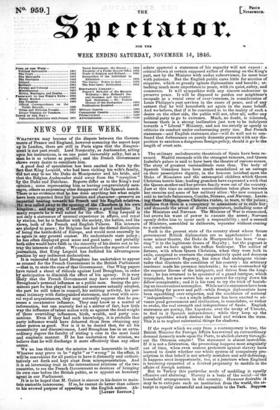NEWS OF THE WEEK.
WIELTRYBR may become of the dispute between the Govern- ..ments of Prance and England, however menacing the aspect kept up in London, there are still in Paris signs that the disagree- ment is not past recall. Lord Normanby, as Ambassador, acting .upon his instructions, is on one point inexorably sulky, bit as a man he is as urbane as possible ; and the French Government shows every desire to conciliate him.
A good deal of speculation has been excited in Paris by the
-tact that King Leopold, who had been visiting his wife's family, :did not stay to see the Duke de Montpensier and his bride, and that the Belgian-Ambassador staid away from the " reception" by the Duke and That-chess. Reports differ as to the King's real opinion ; some representing him as leaving congratulatory mes- sages, others as expressing utter disapproval of the Spanish match. There is no evidence that he has done anything but what might have been expected from his position and character—preserve an impartial bearing towards his French and his English relatives.
He was called away to the opening of the Chambers in his own
kingdom ; and may yet, if needful, prove a good mediator. In many respects he is well suited for the office. King Leopold is not only a statesman of unusual-experience in affairs, and royal by station, but he is familiar'with the society, the habits, and the views, both of the French and English Palaces. His interests are pledged to peace ; for Belgium has had the dismal distinction of being the battle-field of Europe, and would most assuredly be so again in any general contest. He understands state policy ; he has often displayed good sense and good taste ; and probably both sides would have faith in the sincerity of his desire not to be- tray the interests of either. We cannot believe the reports of some journalists, that King Leopold has forfeited his advantageous position by any indiscreet declarations.
It is rumoured that Lord Brougham has undertaken to appear as counsel for the French Government in the British Parliament —that is, to state the case of that Government. Our Whig papers have raised a shout of ridicule against Lord Brougham, in order by anticipation to diminish the effect of his agency. It is very likely that the French Government may have overrated Lord Brougham's personal influence as a public man. Seeing the pro- minent part he has played in national measures actually adopted, the part he still takes in council, his untiring activity, his per- sonal intimacy with distinguished statesmen, and even with seve- ral royal acquaintances, they may naturally suppose that he pos- sesses a coextensive influence. They may know as a matter of information, but can scarcely feel as a matter of fact, how little way the influence of talent makes with us against the dead weight of three overriding influences, birth, wealth, and party con- nexions. Even if they had such knowledge, it is probable that party influence would have debarred them from obtaining any other patron as good. Nor is it to be denied that, for all his eccentricity and discursiveness, Lord Brougham has in an extra- ordinary degree the faculty of stating a case in the most lucid and emphatic manner. If he has undertaken the mission, we believe that he will discharge it more effectively than any other orator.
We no less think that the mission is one honourable in itself.
Whoever may prove to be " right " or " wrong" in the affair, it will be convenient for all parties to have it distinctly and authori- tatively set forth and kept clear from misrepresentation. And it is an interesting trait in the international relations of the two countries, to see the French Government so desirous of bringing its own case before the British public, as to appoint an honorary agent in our Parliament. It is to be hoped that M. Guizot is sincere in his desire to main- tain amicable intercourse. If so, he cannot do better than adhere to his avowed purpose of appealing to the English nation. Ab-
solute approval a statesman of his sagacity will not expect : a critical frown at certain supposed sallies of cunning on the King's part, met by the Minister with undue subservience, he must bear with patience. But the English public cares little for niceties of etiquette, which so greatly agitate diplomatists and heralds ; at- taching much more importance to peace, with its quiet, safety, and commerce. It will sympathize with any sincere endeavour to preserve peace. It will be disposed to pardon our neighbour's escapade as a venial error of over-'cuteness, in consideration of Louis Philippe's past services in the cause of peace, and of any earnest that he will henceforth act again in the same behalf. And we believe, that if it be convinced as to the reality of such a desire on the other side, the public will not, after all, suffer any political party to go to extremes. Much, no doubt, is tolerated, because there is a strong inclination just now to be indulgent towards a " Liberal" Ministry, and not too strictly or openly to criticize its conduct under embarrassing party ties. But French statesmen—and English statesmen also—will do well not to con- found that forbearance on purely domestic grounds'
rounds with any dis- position to sanction a dangerous foreign policy, should it go to the length of overt acts.


























